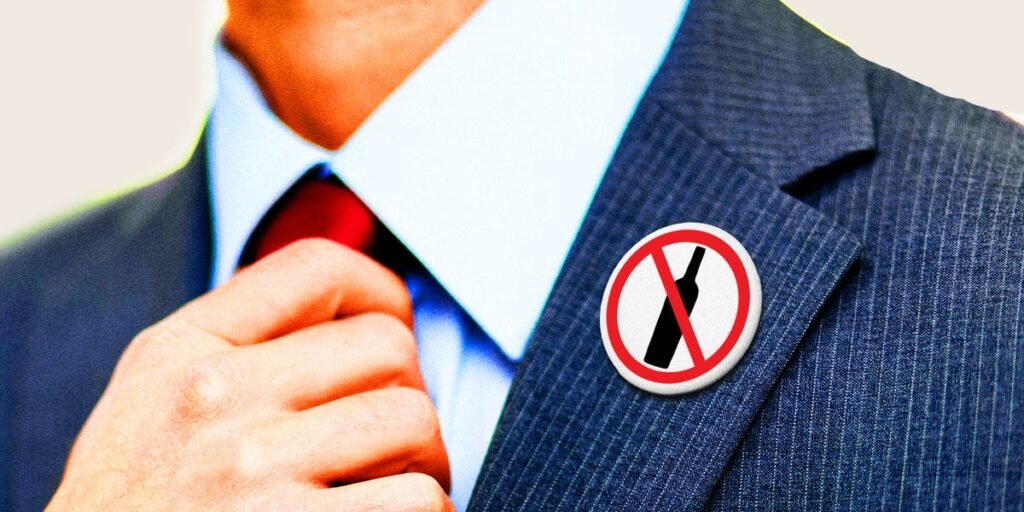When Jackson Stokes was at a recent dinner with other tech founders in their mid-20s, most of them nursed a single drink. Then one friend ordered a round of shots for the table.
“I don’t think it was received super well,” Stokes told Business Insider. “I know it’s a Friday night, but this isn’t what we wanted.”
The 26-year-old TrainLoop cofounder said that they were “at the age where we want to have a good morning the next day,” and that hard liquor felt like a “detriment.”
It’s no secret that Americans are drinking less. Alcohol consumption per capita is on track to fall 1% year-over-year in 2025 in the US, the fourth-straight year of decline, according to Bank of America analysts. Young people seem to be leading the charge: A 2023 Gallup poll found 62% of under-35-year-olds reported drinking, a decline of 10% over the last two decades.
In Silicon Valley, that overall trend appears to be at least partly compounded by startups’ famously hardcore work culture, with long hours leaving less time for partying. Health gurus like Bryan Johnson and Andrew Huberman are also on the rise, advising the next generation of entrepreneurs to give up their vices.
Business Insider spoke with nine young founders about their drinking habits. Almost all of them said they had drastically cut back on alcohol, ranging from full-throated sobriety to occasional monthly sips. Some said they might drink while in New York, but practiced sobriety in San Francisco.
While that doesn’t mean there aren’t young founders who consume alcohol regularly or in excess, the entrepreneurs’ views on drinking highlight that abstaining is commonplace among their Silicon Valley peers — and, in some cases, looked at as a signal of dedication to the startup grind.
Chris Pisarski’s company Crustdata was in the Fall 2024 cohort of Y Combinator. At the startup accelerator’s events, Pisarski noticed an apparently sober crowd.
“There’s opportunities to drink, but the bar was empty,” he said. “I was always fascinated by that.”
Pisarski said that he “very rarely” drinks, having one glass of wine a month. That answer was common among the founders interviewed — not fully sober, but any drinking was very occasional.
Many of the sober-ish founders cited long work stretches and the need for sustained focus.
In Docket cofounder Boris Skurikhin’s YC cohort, he said the younger founders often spoke about having to “lock in.”
“It entails the person working long hours and foregoing any extravagant social interaction and drinking,” Skurikhin said. “Especially during the batch, some people made it a pact to only dedicate their time to sleeping and working.”
Skurikhin is 25 and drinks occasionally. The most fervent of the “locked in” fully sober crowd, he said, was around 21.
Fort cofounder Miranda Nover said that image was important to these entrepreneurs.
“If you were a software founder, a B2B SAAS founder, an AI founder, you were definitely trying to signal: We’re doing this six days a week in-office, we’re working until 9 p.m., we’re not drinking, we’re not partying, we don’t do any of that,” she said.
Nover said that might be shifting. As people pay more attention to “consumer distribution” and “mimetic value of founders,” she said, there may be a renewed focus on sociability.
Cyril Gorlla, cofounder of CTGT, considers drinking to be a “poison.” He described workweeks of 80-90 hours, something that drinking would inhibit. “We say, ‘your body’s a temple,'” he said.
Gorlla hit on another common reason for the drinking slowdown in the Valley: An increased focus on health. Founders who spoke to Business Insider listed their supplements and showed off their Oura rings. Multiple founders mentioned popular health-focused personalities like longevity-obsessed Bryan Johnson, founder of Braintree, who now says he’s alcohol free after giving up a daily 3-oz glass of wine because of the 71 calories it contained.
Kieran White, cofounder of Curo, said he’s been sober since he was young. He compared being a founder to being a professional athlete.
“You always have to perform,” he said.
White’s cofounder, Andrew Porter, still drinks, sipping on an IPA where he can find them. But he said he’s cut back, only drinking at VC and networking events. He’s not partying at all.
“I’m in grind mode right now,” Porter said.
There could also be regional influences. California has long been a hot spot for health trends, especially in its cities.
Porter said that he drinks more in New York City than in San Francisco. White said that drinking culture was different back in the United Kingdom. Jaspar Carmichael-Jack, CEO of Artisan, foregoes drinking entirely when he’s in the Valley.
So what happened to the free-wheeling party culture of the early Facebook era? The way young founders describe the scene today, it’s mostly drying up — at least on the alcohol front.
Bond cofounder Chloe Samaha said that she still goes to house parties, but sees many attendees with LaCroix sparkling waters in their hands.
Gorlla compared the sober party culture to the “intellectual conversations” of 1920s prohibition speakeasies.
“It’s moving towards a congregation of intelligentsia,” he said. “A lot of stuff actually gets done. We’ve had connections where we’ve hired people.”
Read the full article here



